高中英语 Unit2 onwards and upwards 语法课件--非谓语动词 外研版 选择性必修一
文档属性
| 名称 | 高中英语 Unit2 onwards and upwards 语法课件--非谓语动词 外研版 选择性必修一 |  | |
| 格式 | pptx | ||
| 文件大小 | 7.7MB | ||
| 资源类型 | 试卷 | ||
| 版本资源 | 外研版(2019) | ||
| 科目 | 英语 | ||
| 更新时间 | 2024-09-14 09:42:08 | ||
图片预览


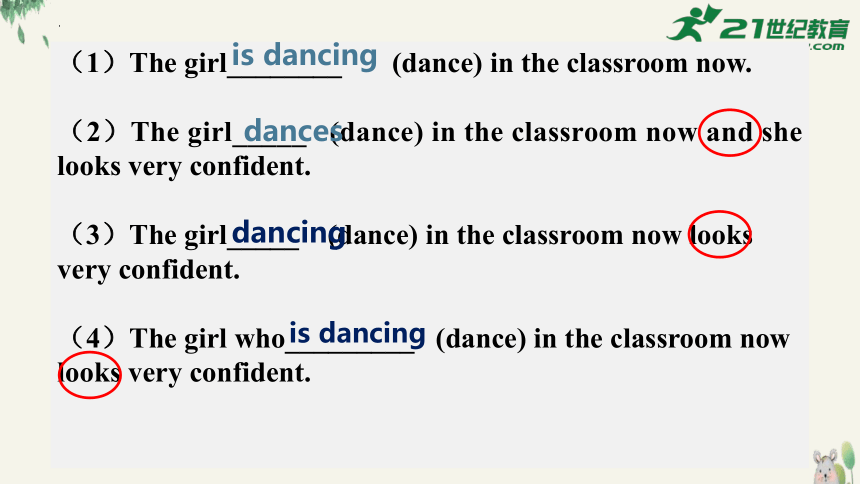
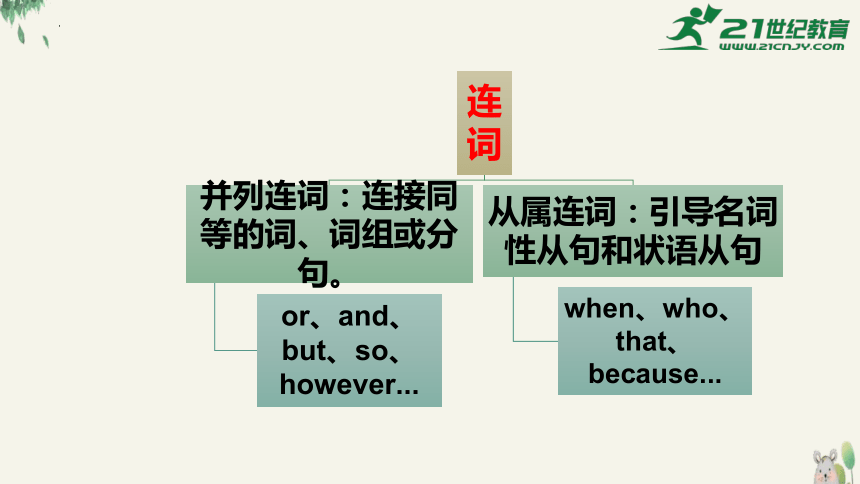
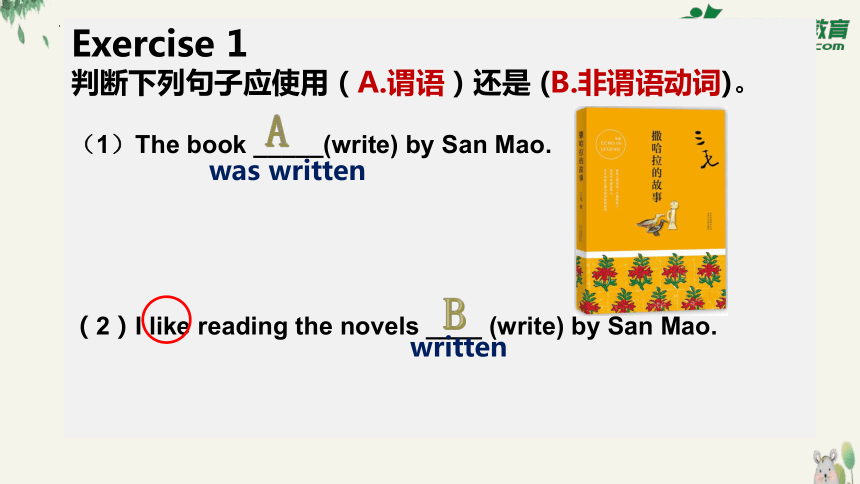
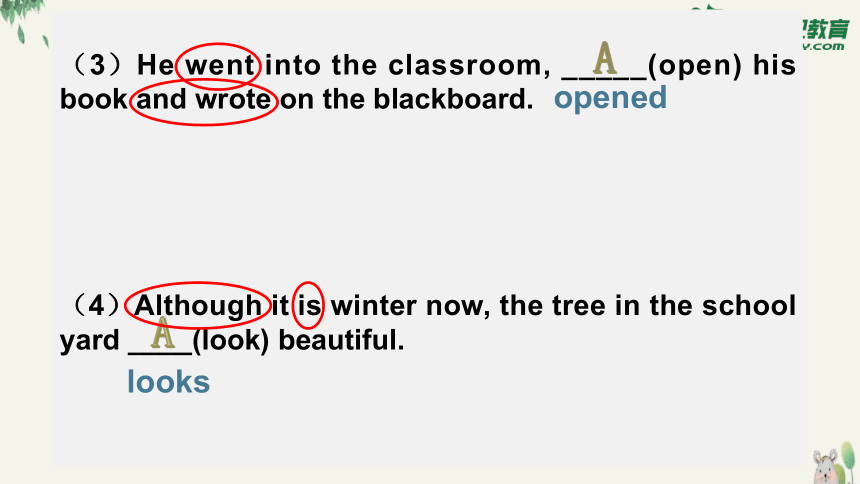
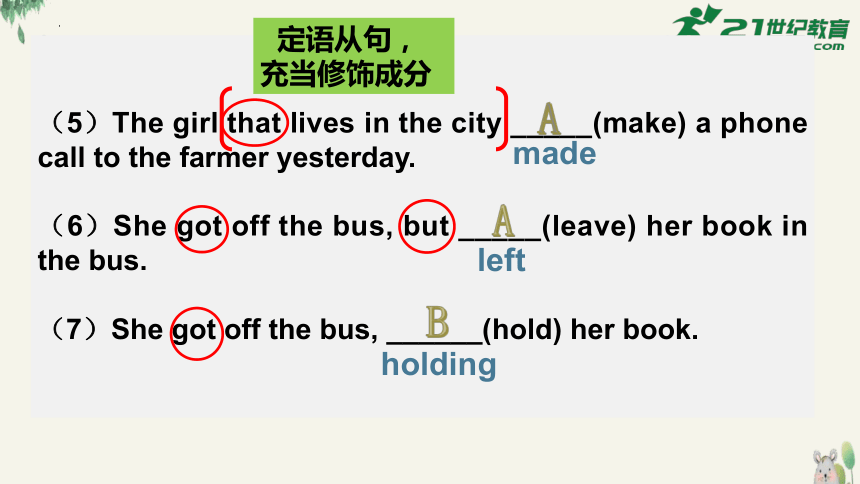

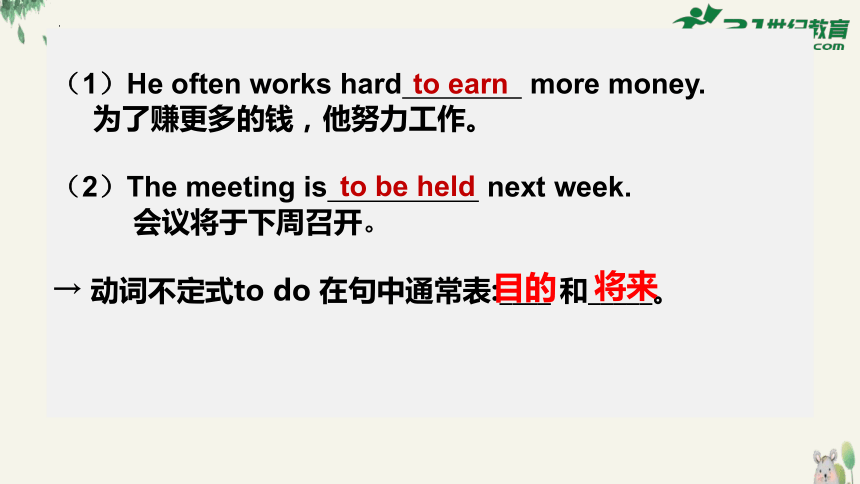
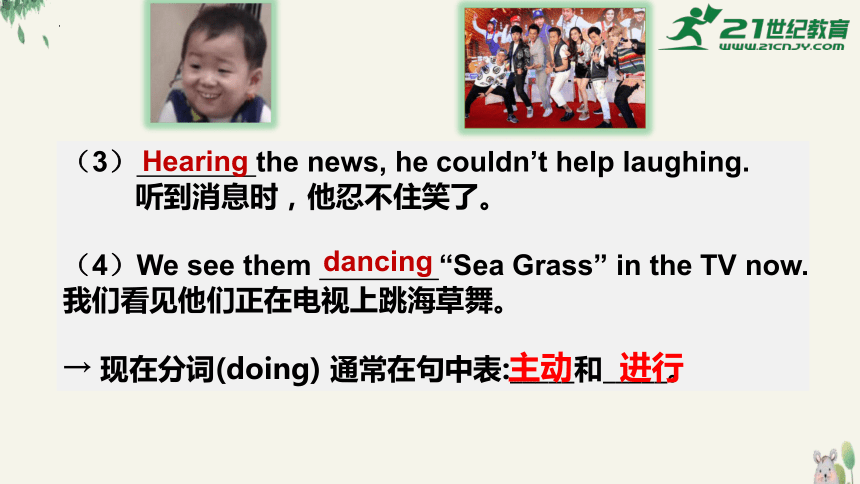

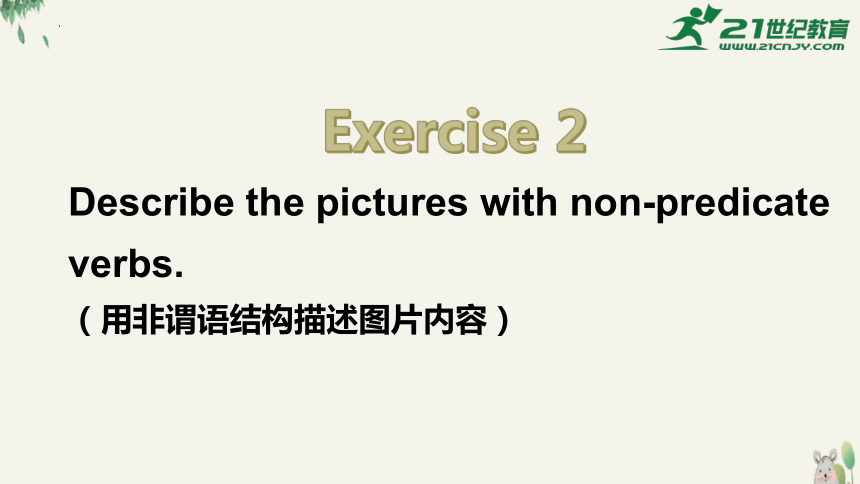
文档简介
(共53张PPT)
Non-predicate verbs
非谓语动词
学会判断何时使用非谓语动词
Task 1
(1)The girl________ (dance) in the classroom now.
(2)The girl_____ (dance) in the classroom now and she looks very confident.
(3)The girl_____ (dance) in the classroom now looks very confident.
(4)The girl who_________ (dance) in the classroom now looks very confident.
dances
is dancing
dancing
is dancing
Exercise 1
判断下列句子应使用(A.谓语)还是 (B.非谓语动词)。
(1)The book _____(write) by San Mao.
(2)I like reading the novels ____ (write) by San Mao.
A
B
was written
written
(3)He went into the classroom, _____(open) his book and wrote on the blackboard.
(4)Although it is winter now, the tree in the school yard ____(look) beautiful.
A
A
looks
opened
(5)The girl that lives in the city _____(make) a phone call to the farmer yesterday.
(6)She got off the bus, but _____(leave) her book in the bus.
(7)She got off the bus, ______(hold) her book.
A
A
B
made
left
holding
定语从句,
充当修饰成分
选择恰当的非谓语动词形式
非谓语动词 三种基本形式 动词 不定式 动名词、现在分词 过去
分词
to do doing done
Task 2
(1)He often works hard more money.
为了赚更多的钱,他努力工作。
(2)The meeting is next week.
会议将于下周召开。
→ 动词不定式to do 在句中通常表:____ 和_____。
目的
将来
to earn
to be held
(3) the news, he couldn’t help laughing.
听到消息时,他忍不住笑了。
(4)We see them “Sea Grass” in the TV now. 我们看见他们正在电视上跳海草舞。
→ 现在分词(doing) 通常在句中表:_____和_____。
主动
进行
Hearing
dancing
(5) at by others, he was told “No zuo no die why you try.”
他被别人指着说:“不作死就不会死。”
(6)You can drink water.
你可以喝开水。
→ 过去分词(done) 通常在句中表: _____和_____。
被动
完成
Pointed
boiled
Exercise 2
Describe the pictures with non-predicate verbs.
(用非谓语结构描述图片内容)
(1)_________(arrive) at the classroom early, we got up at 6:00.
To arrive
(2)I saw four girls _________(wear) different clothes.
wearing
(3)Two women ____________(interview) about the product said they liked it.
interviewed
(4)The stadium _____(build) by the company last year can hold 1 million people.
built
(5)I should do more exercises ___________(improve) my English.
to improve
(6)___________(follow) by the headmaster, Mr. Li came out of the classroom.
Followed
(7)We can see Guan Xiaotong _______(give) a lecture on the stage.
giving
(1) _______(kiss) by her parents, the girl was very happy.
________(kiss) their daughter, the couple was very excited.
Task 3 如何判断主动 or 被动?
→ 提示:找到非谓语动词的逻辑主语,并判断其和非谓语动词的主被动关系。
Kissed
Kissing
(2) _____(see) from the air, Jinghe looks beautiful.
______ (see) from the air, you will find Jinghe beautiful.
Seen
Seeing
2
1
点击添加文本
点击添加文本
点击添加文本
点击添加文本
判断非谓语动词的形式:
→ 表目的和将来,用__________________
→ 表主动和进行,用__________________
→ 表被动和完成,用__________________
确定谓语动词 or 非谓语动词 ?
→填非谓语:句子中已有_______且无_______。
逻辑
主语
动词
连词
不定式to do
现在分词doing
过去分词done
Step 3 Summary: conclude the golden rules.
Step 4
Group-discussion exercise
Discuss with your group members and then finish the following exercises.
1. Chinese researchers hope to use the instruments onboard Chang’e-4 _______ (find) and study areas of the South Pole-Aitken basin.
作目的状语,应用不定式,use sth to do意为“使用某物做……”,故填to find。
to find
高考真题回顾
2. They represent the earth _________ (come) back to life and best wishes for new beginnings.
句中已有谓语represent,故come应为非谓语动词; 此处为动名词的复合结构与best wishes并列作represent的宾语,其逻辑主语为the earth, 应用主动形式,故填coming。
coming
3. They make great gifts and you see them many times __________ (decorate) with red envelopes and messages of good fortune.
此处为“see+宾语+宾补”结构,decorate与其逻辑主语them之间为被动关系,应用过去分词作宾补,故填decorated。
decorated
4. They are easy _________(care) for and make great presents.
此处为“主语+be+adj.+to do”结构,用动词不定式表被动,故填to care。
5. The next morning he hired a boat and set out _______ (find) the well-known painter.
作目的状语,应用动词不定式,故填to find。
to care
to find
6. These days, it is not unusual for 10-to 12-year-olds to publish their own websites or for second and third graders _________ (begin) computer classes.
因It is+adj.+for sb to do sth是固定搭配。
to begin
7.Modern methods ... have been employed only since the mid-1980s, and are expensive ____________ (perform) consistently over a large area.
因句中已有谓语are expensive(系动词加表语构成谓语), 动词perform应为非谓语动词; 在形容词后作状语, 只能用动词不定式, 故填to perform。
to perform
8. On the last day of our week-long stay, we were invited to attend a private concert on a beautiful farm, _________(listen) to musicians and meeting interesting locals.
句中已有谓语invite, 故listen应作为非谓语动词; 又由we与listen在逻辑上存在着主动关系, 故用现在分词形式作状语。
listening
主语 宾语 宾补 表语 定语 状语
to do √ √ √ √ √ √
doing √ √ √ √
done √ √ √ √
非谓语动词做宾语
Read the sentences.
a J D. Salinger started writing short stories in school,
b J D. Salinger started to write short stories in high school,
e These are the words that every writer dreads receiving,
c Nevertheless, the sisters didn’t stop trying.
d Nevertheless, the sisters didn’t stop to try.
1 Do sentences (a) and (b) have the same meaning
Yes, they do.
2 Do sentences (c) and (d) have the same meaning
No, they don’t.
3 Can “receiving” in sentence (e) be changed into “to receive”
No, it can’t.
动词后接非谓语动词作宾语的情况分为三种:
只能接-ing;
只能接to-infinitive;
接-ing或to-infinitive皆可。
Focus on
重点关注
-ing and to-infinitive
as object
1. 常接动词不定式作宾语的及物动词有:
agree, choose, decide, hope, fail, wish, refuse, expect, manage, plan, intend, pretend, promise, offer, afford, demand, arrange等。例如:
What did they decide to do
She failed to come to school yesterday.
I hope to be back soon.
I am out of work so I cannot afford to live in this big flat.
1.This company refuse (cooperate) with us.
2. He said he wished (be ) a professor.
3. l agreed (go ) there with the doctor.
Practice:
to cooperate
to be
to go
2. 常接动名词作宾语的及物动词有:
finish, enjoy, mind, keep, miss, avoid, consider, imagine, practise, delay, escape, excuse, allow, suggest等。例如:
我们可以在下个月底之前建好这座桥。
We can finish building the bridge before the end of
next month.
请您开一下窗户,好吗?
Would you mind opening the window
1.People avoided (talk) about this.
2.He was in low spirits and even considered ( go ) away.
3.I can't help ( have ) the trip to Britain.
Practice:
talking
going
having
3. 两者均可接的及物动词有:
1) 有些及物动词后既可接动名词作宾语, 又可接动词不
定式作宾语,且两者意义差别不大。这类词有:
prefer, hate, begin, start, continue, like,love等。
离开教室后,学生们开始做作业。
After the teacher left the classroom, the students began
to do/ doing their homework.
3. 两者均可接的及物动词有:
2) 有些及物动词后既可接动名词作宾语,又可接动词
不定式作宾语,但两者结构意义不同。
① 像remember, forget, regret这类词;
remember, forget, regret + to do
remember, forget, regret +doing
表示该动作还未发生
表示该动作已经发生
forget doing sth 忘记曾经做过某事(动作已发生)
forget to do sth 忘记要去做某事(动作并未发生)
a. I shall never forget hearing her singing
that song.
我将不会忘记听过她唱那支歌的情景。
b. I have forgotten to bring my umbrella.
我忘了带伞。
a. I remember seeing you somewhere in
London.
我记得在伦敦什么地方见到过你。
b. Do you remember to post the letter
你记住寄这封信了吗
remember doing sth 记得曾经做过某事(动作已发生)
remember to do sth 记住去做某事(动作还没有发生)
regret doing sth. 后悔做过某事
(事情已经做过)
regret to do sth. 遗憾要做某事
(事情正要做或还未做)
a. I regret lending him so much money because he never paid me back.
我很后悔借给他那么多钱,因为他从来没有还过我。
b. I regret to tell you that you failed the test.
我遗憾的告诉你,你没有通过考试。
a. Why not try doing it in some other
way
为什么不用其他办法试一试呢?
b. I tried to solve the problem but I
couldn’t.
我努力解答那个题,但我解不出。
try doing sth 试着做某事
try to do sth 尽力去做某事
a. Please stop talking aloud.
请不要大声说话。
b. They stopped to take photos.
他们停下来去拍照。
stop doing sth 停止做某事 stop to do sth 停下来正在做的
事情去做另外一件事
I didn't mean ______ anything but the ice cream looked so good that I couldn’t help_____ it.
A. to eat;to try
B. eating;trying
C. eating;to try
D. to eat;trying
随堂随练
I can’t imagine _____ that with them.
A. do B. to do
C. being done D. doing
随堂随练
√
解析:本题考查习惯用法:imagine doing sth. 意为“想
象做某事”。动名词doing作imagine的宾语。答案选D。
1. In the future, the team hopes __________ (develop) a version of the technology that can be sprayed onto plant leaves in a one-off treatment that would last the plant’s lifetime.
2. But some students didn't want _______ (wear) the uniform.
to develop
to wear
随堂随练
Practice
Complete the passage with the correct form of the verbs in brackets.
to live
to use
swimming/ to swim
swimming
to learn
practising
At the age of ten, Liu Wei lost both his arms in an accident.
Despite this, he wanted ______(live) life to the full. He learnt
______(use) his feet for everyday activities, such as eating
and brushing his teeth. He also started __________________(swim) and won two gold medals at the National Games for People with Disabilities. When he had to stop __________(swim)due to health problems, he decided __________ (learn) how to play the piano with his toes. It was difficult, but he kept __________(practise) until he had achieved his goal. In 2010, he won in China’s Got Talent and became famous nationwide. Today, Liu Wei still enjoys _______(play) music, and his positive attitude is an inspiration to us all.
to live
to use
swimming/ to swim
swimming
to learn
practising
playing
Grammar
Focus
-ing and to
-infinitive
as object
动词+-ing
动词+ to-infinitive
语义无区别
语义有区别
动词 + -ing(只能接-ing作宾语)
动词 + to-infinitive(只能接 to-infinitive作宾语)
Non-predicate verbs
非谓语动词
学会判断何时使用非谓语动词
Task 1
(1)The girl________ (dance) in the classroom now.
(2)The girl_____ (dance) in the classroom now and she looks very confident.
(3)The girl_____ (dance) in the classroom now looks very confident.
(4)The girl who_________ (dance) in the classroom now looks very confident.
dances
is dancing
dancing
is dancing
Exercise 1
判断下列句子应使用(A.谓语)还是 (B.非谓语动词)。
(1)The book _____(write) by San Mao.
(2)I like reading the novels ____ (write) by San Mao.
A
B
was written
written
(3)He went into the classroom, _____(open) his book and wrote on the blackboard.
(4)Although it is winter now, the tree in the school yard ____(look) beautiful.
A
A
looks
opened
(5)The girl that lives in the city _____(make) a phone call to the farmer yesterday.
(6)She got off the bus, but _____(leave) her book in the bus.
(7)She got off the bus, ______(hold) her book.
A
A
B
made
left
holding
定语从句,
充当修饰成分
选择恰当的非谓语动词形式
非谓语动词 三种基本形式 动词 不定式 动名词、现在分词 过去
分词
to do doing done
Task 2
(1)He often works hard more money.
为了赚更多的钱,他努力工作。
(2)The meeting is next week.
会议将于下周召开。
→ 动词不定式to do 在句中通常表:____ 和_____。
目的
将来
to earn
to be held
(3) the news, he couldn’t help laughing.
听到消息时,他忍不住笑了。
(4)We see them “Sea Grass” in the TV now. 我们看见他们正在电视上跳海草舞。
→ 现在分词(doing) 通常在句中表:_____和_____。
主动
进行
Hearing
dancing
(5) at by others, he was told “No zuo no die why you try.”
他被别人指着说:“不作死就不会死。”
(6)You can drink water.
你可以喝开水。
→ 过去分词(done) 通常在句中表: _____和_____。
被动
完成
Pointed
boiled
Exercise 2
Describe the pictures with non-predicate verbs.
(用非谓语结构描述图片内容)
(1)_________(arrive) at the classroom early, we got up at 6:00.
To arrive
(2)I saw four girls _________(wear) different clothes.
wearing
(3)Two women ____________(interview) about the product said they liked it.
interviewed
(4)The stadium _____(build) by the company last year can hold 1 million people.
built
(5)I should do more exercises ___________(improve) my English.
to improve
(6)___________(follow) by the headmaster, Mr. Li came out of the classroom.
Followed
(7)We can see Guan Xiaotong _______(give) a lecture on the stage.
giving
(1) _______(kiss) by her parents, the girl was very happy.
________(kiss) their daughter, the couple was very excited.
Task 3 如何判断主动 or 被动?
→ 提示:找到非谓语动词的逻辑主语,并判断其和非谓语动词的主被动关系。
Kissed
Kissing
(2) _____(see) from the air, Jinghe looks beautiful.
______ (see) from the air, you will find Jinghe beautiful.
Seen
Seeing
2
1
点击添加文本
点击添加文本
点击添加文本
点击添加文本
判断非谓语动词的形式:
→ 表目的和将来,用__________________
→ 表主动和进行,用__________________
→ 表被动和完成,用__________________
确定谓语动词 or 非谓语动词 ?
→填非谓语:句子中已有_______且无_______。
逻辑
主语
动词
连词
不定式to do
现在分词doing
过去分词done
Step 3 Summary: conclude the golden rules.
Step 4
Group-discussion exercise
Discuss with your group members and then finish the following exercises.
1. Chinese researchers hope to use the instruments onboard Chang’e-4 _______ (find) and study areas of the South Pole-Aitken basin.
作目的状语,应用不定式,use sth to do意为“使用某物做……”,故填to find。
to find
高考真题回顾
2. They represent the earth _________ (come) back to life and best wishes for new beginnings.
句中已有谓语represent,故come应为非谓语动词; 此处为动名词的复合结构与best wishes并列作represent的宾语,其逻辑主语为the earth, 应用主动形式,故填coming。
coming
3. They make great gifts and you see them many times __________ (decorate) with red envelopes and messages of good fortune.
此处为“see+宾语+宾补”结构,decorate与其逻辑主语them之间为被动关系,应用过去分词作宾补,故填decorated。
decorated
4. They are easy _________(care) for and make great presents.
此处为“主语+be+adj.+to do”结构,用动词不定式表被动,故填to care。
5. The next morning he hired a boat and set out _______ (find) the well-known painter.
作目的状语,应用动词不定式,故填to find。
to care
to find
6. These days, it is not unusual for 10-to 12-year-olds to publish their own websites or for second and third graders _________ (begin) computer classes.
因It is+adj.+for sb to do sth是固定搭配。
to begin
7.Modern methods ... have been employed only since the mid-1980s, and are expensive ____________ (perform) consistently over a large area.
因句中已有谓语are expensive(系动词加表语构成谓语), 动词perform应为非谓语动词; 在形容词后作状语, 只能用动词不定式, 故填to perform。
to perform
8. On the last day of our week-long stay, we were invited to attend a private concert on a beautiful farm, _________(listen) to musicians and meeting interesting locals.
句中已有谓语invite, 故listen应作为非谓语动词; 又由we与listen在逻辑上存在着主动关系, 故用现在分词形式作状语。
listening
主语 宾语 宾补 表语 定语 状语
to do √ √ √ √ √ √
doing √ √ √ √
done √ √ √ √
非谓语动词做宾语
Read the sentences.
a J D. Salinger started writing short stories in school,
b J D. Salinger started to write short stories in high school,
e These are the words that every writer dreads receiving,
c Nevertheless, the sisters didn’t stop trying.
d Nevertheless, the sisters didn’t stop to try.
1 Do sentences (a) and (b) have the same meaning
Yes, they do.
2 Do sentences (c) and (d) have the same meaning
No, they don’t.
3 Can “receiving” in sentence (e) be changed into “to receive”
No, it can’t.
动词后接非谓语动词作宾语的情况分为三种:
只能接-ing;
只能接to-infinitive;
接-ing或to-infinitive皆可。
Focus on
重点关注
-ing and to-infinitive
as object
1. 常接动词不定式作宾语的及物动词有:
agree, choose, decide, hope, fail, wish, refuse, expect, manage, plan, intend, pretend, promise, offer, afford, demand, arrange等。例如:
What did they decide to do
She failed to come to school yesterday.
I hope to be back soon.
I am out of work so I cannot afford to live in this big flat.
1.This company refuse (cooperate) with us.
2. He said he wished (be ) a professor.
3. l agreed (go ) there with the doctor.
Practice:
to cooperate
to be
to go
2. 常接动名词作宾语的及物动词有:
finish, enjoy, mind, keep, miss, avoid, consider, imagine, practise, delay, escape, excuse, allow, suggest等。例如:
我们可以在下个月底之前建好这座桥。
We can finish building the bridge before the end of
next month.
请您开一下窗户,好吗?
Would you mind opening the window
1.People avoided (talk) about this.
2.He was in low spirits and even considered ( go ) away.
3.I can't help ( have ) the trip to Britain.
Practice:
talking
going
having
3. 两者均可接的及物动词有:
1) 有些及物动词后既可接动名词作宾语, 又可接动词不
定式作宾语,且两者意义差别不大。这类词有:
prefer, hate, begin, start, continue, like,love等。
离开教室后,学生们开始做作业。
After the teacher left the classroom, the students began
to do/ doing their homework.
3. 两者均可接的及物动词有:
2) 有些及物动词后既可接动名词作宾语,又可接动词
不定式作宾语,但两者结构意义不同。
① 像remember, forget, regret这类词;
remember, forget, regret + to do
remember, forget, regret +doing
表示该动作还未发生
表示该动作已经发生
forget doing sth 忘记曾经做过某事(动作已发生)
forget to do sth 忘记要去做某事(动作并未发生)
a. I shall never forget hearing her singing
that song.
我将不会忘记听过她唱那支歌的情景。
b. I have forgotten to bring my umbrella.
我忘了带伞。
a. I remember seeing you somewhere in
London.
我记得在伦敦什么地方见到过你。
b. Do you remember to post the letter
你记住寄这封信了吗
remember doing sth 记得曾经做过某事(动作已发生)
remember to do sth 记住去做某事(动作还没有发生)
regret doing sth. 后悔做过某事
(事情已经做过)
regret to do sth. 遗憾要做某事
(事情正要做或还未做)
a. I regret lending him so much money because he never paid me back.
我很后悔借给他那么多钱,因为他从来没有还过我。
b. I regret to tell you that you failed the test.
我遗憾的告诉你,你没有通过考试。
a. Why not try doing it in some other
way
为什么不用其他办法试一试呢?
b. I tried to solve the problem but I
couldn’t.
我努力解答那个题,但我解不出。
try doing sth 试着做某事
try to do sth 尽力去做某事
a. Please stop talking aloud.
请不要大声说话。
b. They stopped to take photos.
他们停下来去拍照。
stop doing sth 停止做某事 stop to do sth 停下来正在做的
事情去做另外一件事
I didn't mean ______ anything but the ice cream looked so good that I couldn’t help_____ it.
A. to eat;to try
B. eating;trying
C. eating;to try
D. to eat;trying
随堂随练
I can’t imagine _____ that with them.
A. do B. to do
C. being done D. doing
随堂随练
√
解析:本题考查习惯用法:imagine doing sth. 意为“想
象做某事”。动名词doing作imagine的宾语。答案选D。
1. In the future, the team hopes __________ (develop) a version of the technology that can be sprayed onto plant leaves in a one-off treatment that would last the plant’s lifetime.
2. But some students didn't want _______ (wear) the uniform.
to develop
to wear
随堂随练
Practice
Complete the passage with the correct form of the verbs in brackets.
to live
to use
swimming/ to swim
swimming
to learn
practising
At the age of ten, Liu Wei lost both his arms in an accident.
Despite this, he wanted ______(live) life to the full. He learnt
______(use) his feet for everyday activities, such as eating
and brushing his teeth. He also started __________________(swim) and won two gold medals at the National Games for People with Disabilities. When he had to stop __________(swim)due to health problems, he decided __________ (learn) how to play the piano with his toes. It was difficult, but he kept __________(practise) until he had achieved his goal. In 2010, he won in China’s Got Talent and became famous nationwide. Today, Liu Wei still enjoys _______(play) music, and his positive attitude is an inspiration to us all.
to live
to use
swimming/ to swim
swimming
to learn
practising
playing
Grammar
Focus
-ing and to
-infinitive
as object
动词+-ing
动词+ to-infinitive
语义无区别
语义有区别
动词 + -ing(只能接-ing作宾语)
动词 + to-infinitive(只能接 to-infinitive作宾语)
